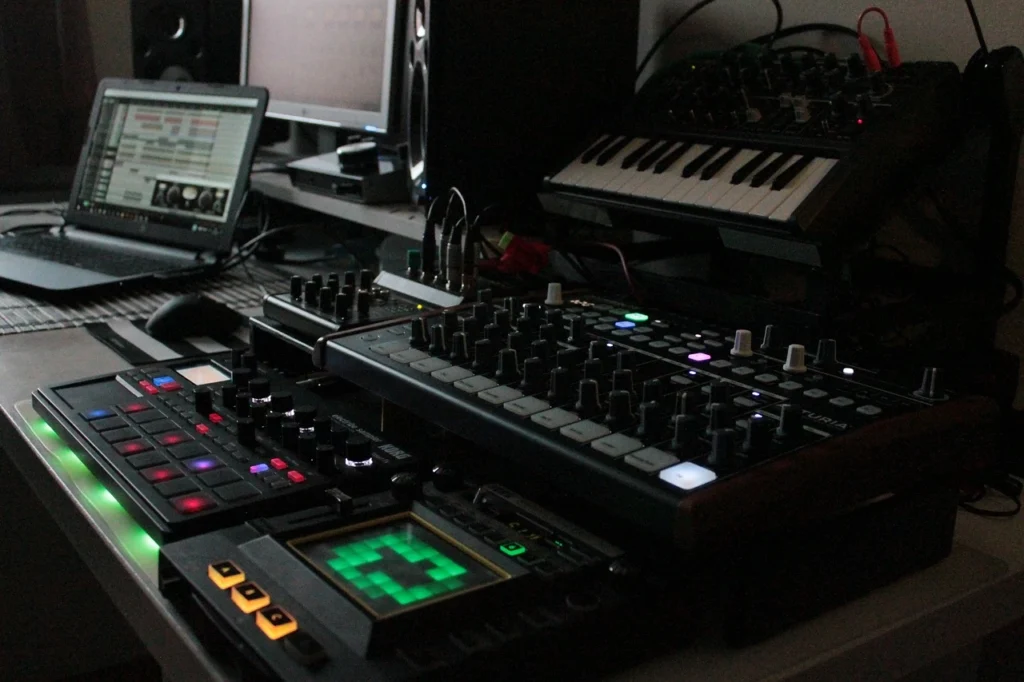
Table of Contents
How does samplers musical instruments work?
Sampler instruments have completely changed how music is composed and produced. We will go into the realm of sampler instruments in this blog article, including their origins, functionality, and influence on contemporary music.
Discover the origins of samplers, their functions, and their influence on contemporary music. Learn the many aspects to take into account when selecting a sampler and investigate the most well-liked samplers available right now. Include a sampler in your music production and begin producing original sounds right now.

Samplers musical instruments history
Sampler instruments have completely changed how music is composed and produced. These multipurpose tools let producers and artists work with sounds in ways that were not possible before. We will go into the realm of sampler instruments in this blog article, including their origins, functionality, and influence on contemporary music.
What is a Sampler?
An electronic musical instrument that records sounds and replays it is called a sampler. With its help, musicians may record and edit sounds to create original and inventive musical pieces. Any sound, including speech, instruments, and commonplace noises, may be sampled using samplers and played again at various pitches and velocities.
A Brief History
The 1940s and 1950s saw the emergence of electronic music, which is when the idea of sampling first appeared. However, samplers were not more generally available or used until the 1970s and 1980s. One of the earliest commercially available samplers was the Fairlight CMI, which was introduced in 1979. It made it possible for musicians to easily sample and modify sounds, which completely changed the music business.
Samplers gained popularity in a variety of musical genres during the 1980s and 1990s, including hip-hop and electronic music. The Prodigy, Depeche Mode, and Public Enemy were among the musicians who embraced the sampler and exploited it to produce avant-garde and inventive music.
How Does a Sampler Work?
Sound recordings are made and then stored in memory by samplers. The audio is then split up into little chunks known as samples. The original sound may be creatively altered by playing these samples again at various pitches and tempos.
With the built-in sequencers and effects that many modern samplers include, musicians may use the sampler to compose whole works. Their capabilities can be further increased by connecting them to a computer or other devices.
Impact on Modern Music
The sampler has greatly influenced contemporary music. It has given musicians the freedom to experiment with new sounds and push the envelope of their creativity. Artists may now produce sounds and textures that were previously unattainable by using a sampler.
In genres such as hip-hop, where producers use existing songs as samples to generate new rhythms and melodies, sampling has become a standard approach. It has also impacted electronic music, where musicians alter and modify sounds in real time during live performances by using samplers.
Furthermore, the sampler has contributed significantly to the growth of electronic dance music (EDM). Samplers are a tool used by producers to generate complex and nuanced soundscapes, which give rise to new EDM sub-genres and styles.
Choosing a Sampler
A sampler’s selection should take a number of elements into account. Important factors to take into account include memory size, integrated effects, and the quantity of sample slots that are accessible. The creative workflow will be significantly impacted by the user interface and simplicity of use, thus these factors must also be taken into account.
Maschine from Native Instruments, the Elektron Octatrack, and the Akai MPC series are a few of the well-known samplers available today. To accommodate a variety of musical tastes and genres, each of these samplers has special features and capabilities.
Conclusion
The music business has undergone a transformation because to sampler instruments, which enable producers and artists to develop original and inventive sounds. Samplers have revolutionized the way that music is composed and produced, from their modest origins in the 1970s to their extensive usage in contemporary music.
Adding a sampler to your setup may unleash a creative world of possibilities, regardless of whether you’re a producer or a professional musician. So why not start experimenting with samplers and producing your own original sounds right now?
Check out this blog related to this blog
Check our featured blog
What is a synthesizers used for?
How Do Musicians Make Money?
How Do Musicians Make Money? Discover the most important revenue streams for musicians: live performances and tours, music sales and streaming, royalties and licensing, and merchandising and brand collaborations. Discover how various revenue streams influence a musician’s financial success and audience involvement in today’s music industry. Understand the value of strategic planning and personal branding…
The Elements of Music Theory: 7 Comprehensive Guide
What is the theory of the music? Music theory is the study of musical practices and possibilities. Its fundamental purpose is to provide a framework for understanding, composing, and evaluating musical works. Music theory allows artists and aficionados to understand the various structures and ideas that drive musical compositions ranging from classical symphonies to modern…
What are The 7 Musical Notes?
What are the 7 musical notes? Learn about the importance of musical notes and the concept of the C major scale. Explore how musical notes are the foundation of music theory and composition, and how they allow musicians to communicate and notate their ideas. Discover the relationship between different notes and how they create melodies…

Leave a Reply